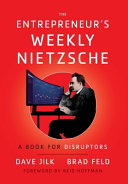

The concept of 'Will to Power' is central to Nietzsche's philosophy and serves as a driving force for entrepreneurs. It encourages individuals to assert their own values and goals in a competitive landscape. Entrepreneurs must harness this will to overcome obstacles, push boundaries, and create something of value. This idea emphasizes the importance of self-determination, ambition, and the relentless pursuit of one's vision. By adopting this mindset, entrepreneurs can navigate challenges with resilience and creativity, ultimately leading to innovation and success.
Continue readingNietzsche famously stated, 'What does not kill me makes me stronger.' This idea is particularly relevant for entrepreneurs, who often face setbacks and failures. The book encourages readers to view adversity not as a hindrance but as an opportunity for growth. By reframing challenges as learning experiences, entrepreneurs can develop resilience and adaptability. This perspective fosters a mindset that embraces risk-taking and experimentation, essential traits for anyone looking to succeed in the unpredictable world of business.
Continue readingNietzsche's philosophy advocates for the creation of personal values rather than adhering to societal norms. For entrepreneurs, this translates to the importance of defining one's own mission and vision. The book emphasizes that successful entrepreneurs are those who dare to challenge the status quo and establish their own criteria for success. This idea encourages readers to reflect on their motivations and align their business practices with their authentic selves, leading to a more fulfilling entrepreneurial journey.
Continue readingIndividualism is a recurring theme in Nietzsche's work, and it resonates deeply with the entrepreneurial spirit. The book highlights the necessity of standing apart from the crowd and embracing one's unique perspective. Entrepreneurs are often innovators who must think differently to solve problems and create value. By fostering individualism, the book encourages readers to cultivate their distinct voice and vision, which can lead to groundbreaking ideas and solutions in the marketplace.
Continue readingEternal recurrence is a thought experiment proposed by Nietzsche that asks individuals to consider how they would live their lives if they had to relive them endlessly. This idea challenges entrepreneurs to evaluate their choices and the impact of their actions. The book suggests that by adopting this perspective, entrepreneurs can prioritize what truly matters in their business and personal lives. It serves as a reminder to focus on meaningful contributions and to live authentically, ensuring that their entrepreneurial journey is fulfilling and impactful.
Continue readingCreativity is a vital component of entrepreneurship, and Nietzsche's philosophy celebrates the power of artistic expression and originality. The book encourages entrepreneurs to embrace their creative instincts and to view innovation as a critical driver of success. By fostering a culture of creativity within their organizations, entrepreneurs can inspire teams to think outside the box and develop unique solutions to complex problems. This idea underscores the necessity of cultivating an environment where experimentation and imaginative thinking are encouraged and rewarded.
Continue readingAuthenticity is a key principle in Nietzsche's philosophy, and it is essential for effective leadership. The book posits that entrepreneurs should lead with integrity, staying true to their values and vision. Authentic leadership fosters trust and loyalty among team members, creating a strong organizational culture. By being transparent and genuine in their actions, entrepreneurs can inspire their teams and stakeholders, ultimately driving better performance and fostering a sense of community within their businesses.
Continue readingThe reading time for The Entrepreneur's Weekly Nietzsche depends on the reader's pace. However, this concise book summary covers the 7 key ideas from The Entrepreneur's Weekly Nietzsche, allowing you to quickly understand the main concepts, insights, and practical applications in around 19 min.
The Entrepreneur's Weekly Nietzsche is definitely worth reading. The book covers essential topics including Embrace the Will to Power, The Importance of Overcoming Adversity, Creating Your Own Values, providing practical insights and actionable advice. Whether you read the full book or our concise summary, The Entrepreneur's Weekly Nietzsche delivers valuable knowledge that can help you improve your understanding and apply these concepts in your personal or professional life.
The Entrepreneur's Weekly Nietzsche was written by Brad Feld, Dave Jilk.
If you enjoyed The Entrepreneur's Weekly Nietzsche by Brad Feld, Dave Jilk and want to explore similar topics or deepen your understanding, we highly recommend these related book summaries:
These books cover related themes, complementary concepts, and will help you build upon the knowledge gained from The Entrepreneur's Weekly Nietzsche. Each of these summaries provides concise insights that can further enhance your understanding and practical application of the ideas presented in The Entrepreneur's Weekly Nietzsche.